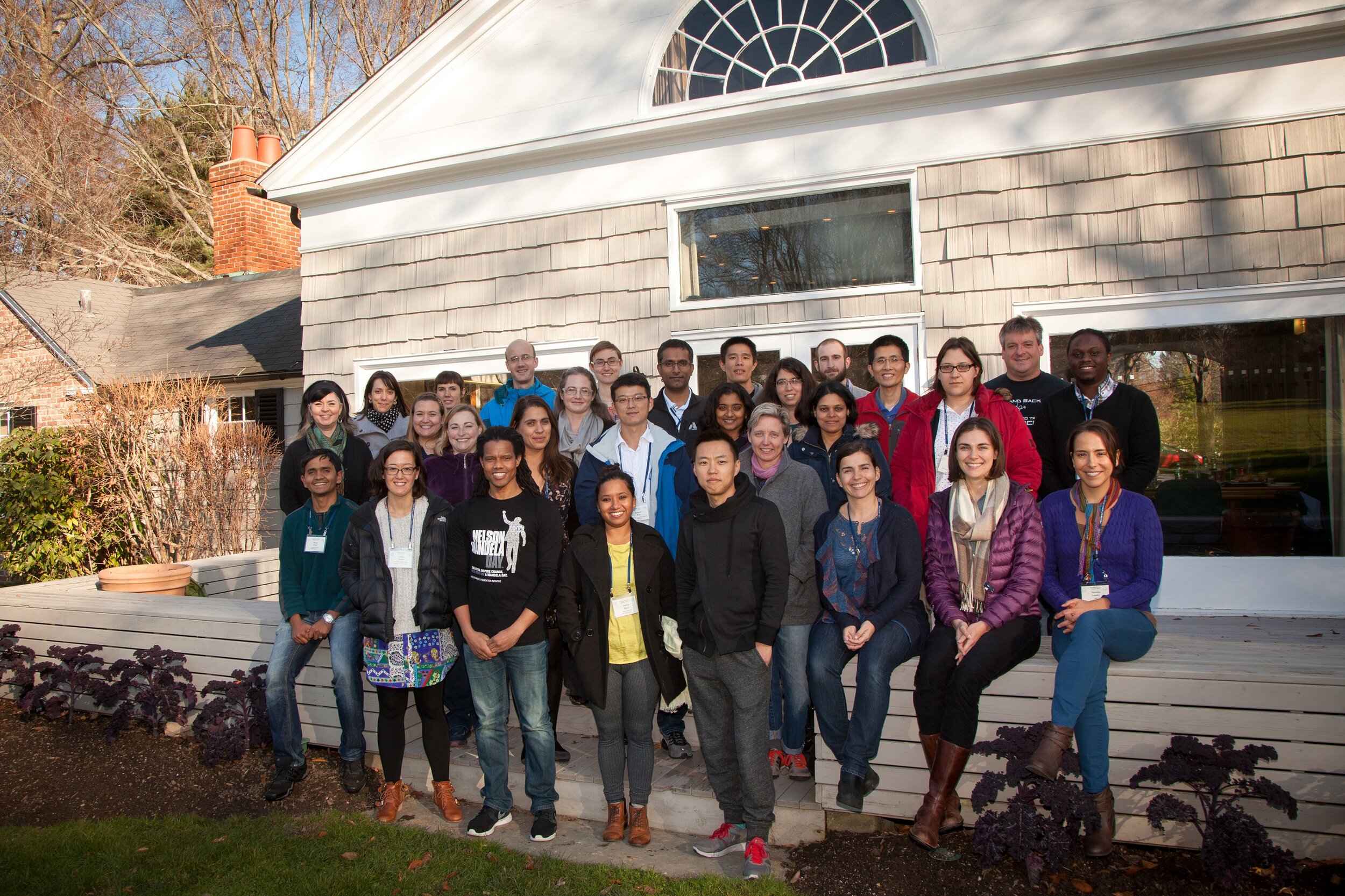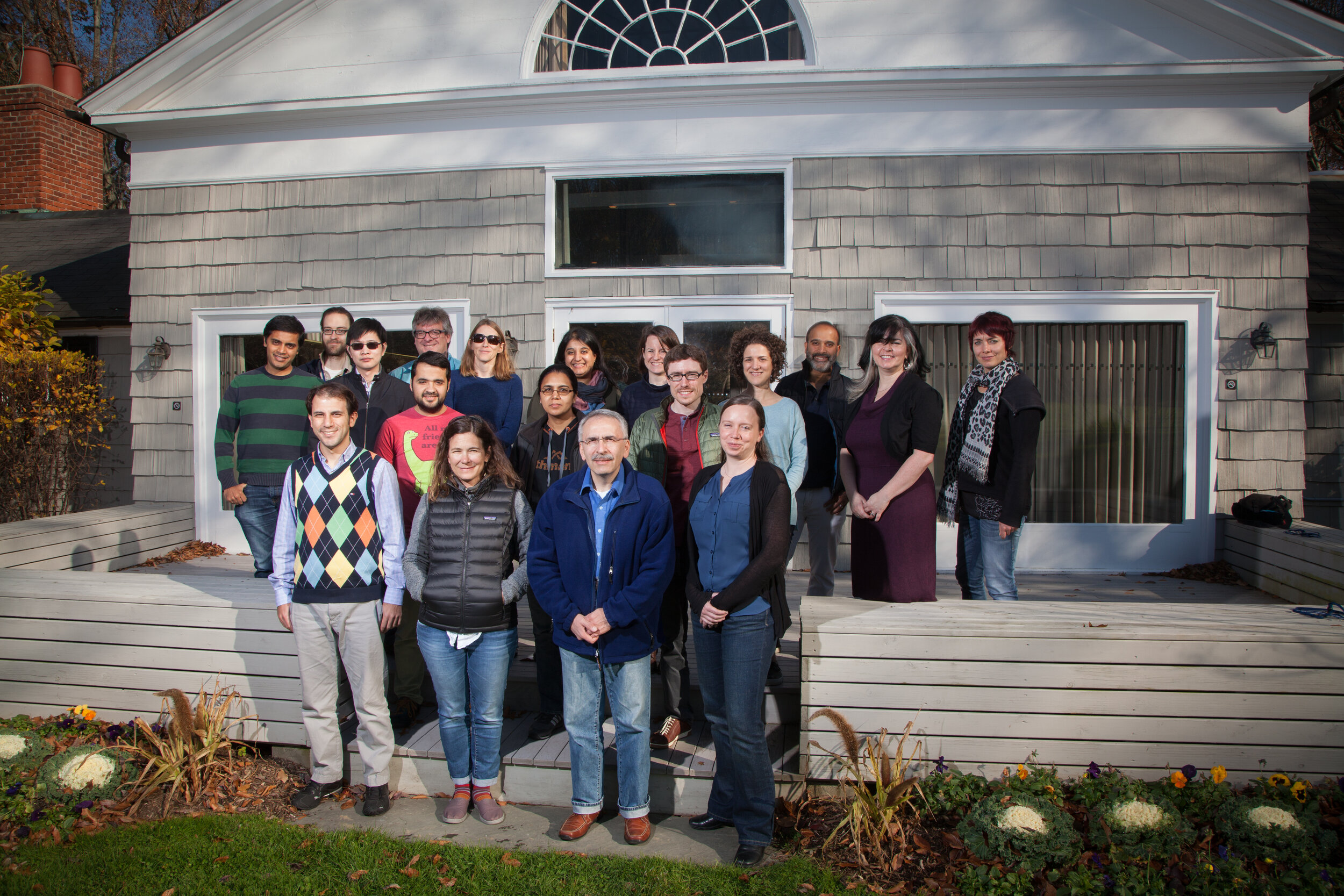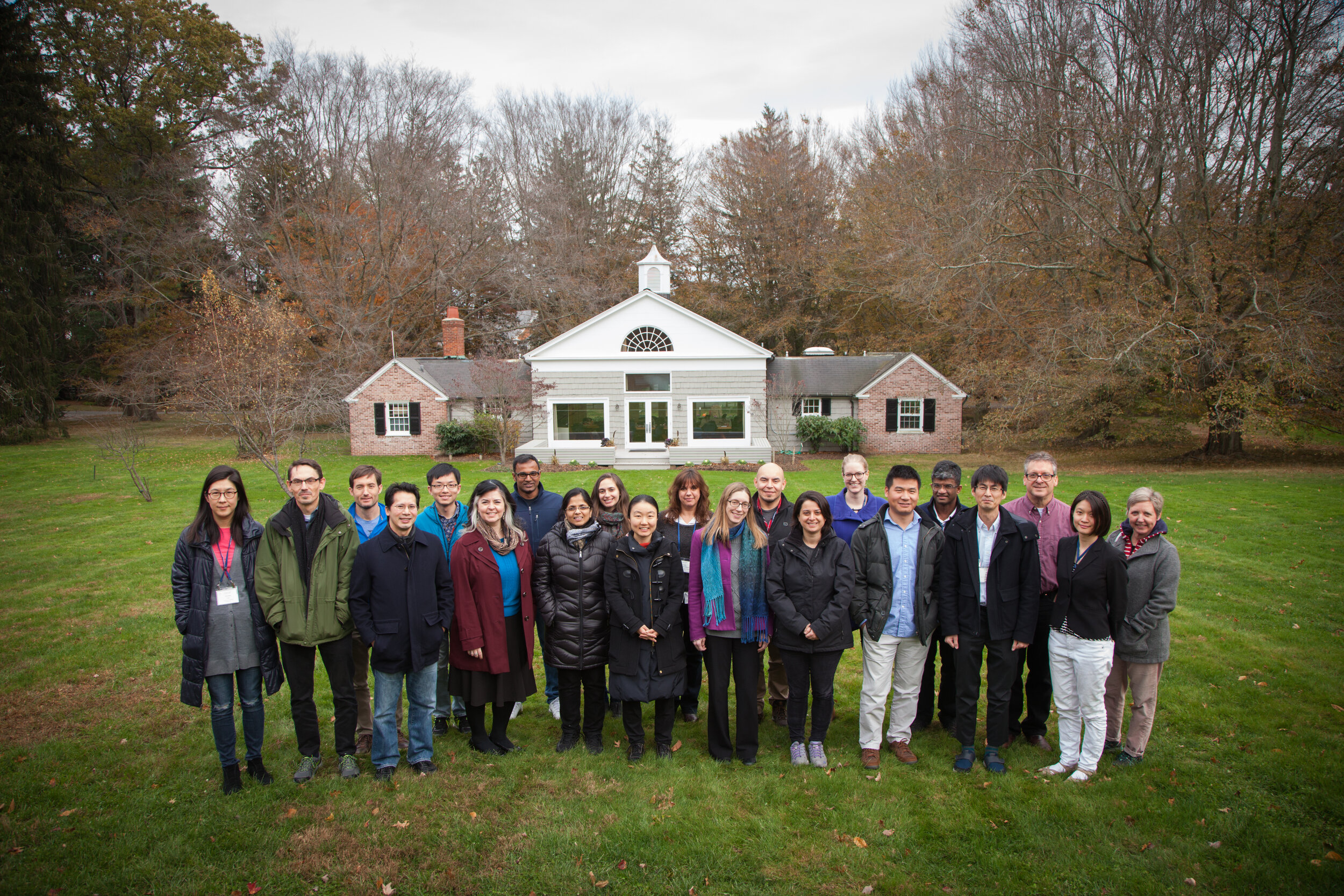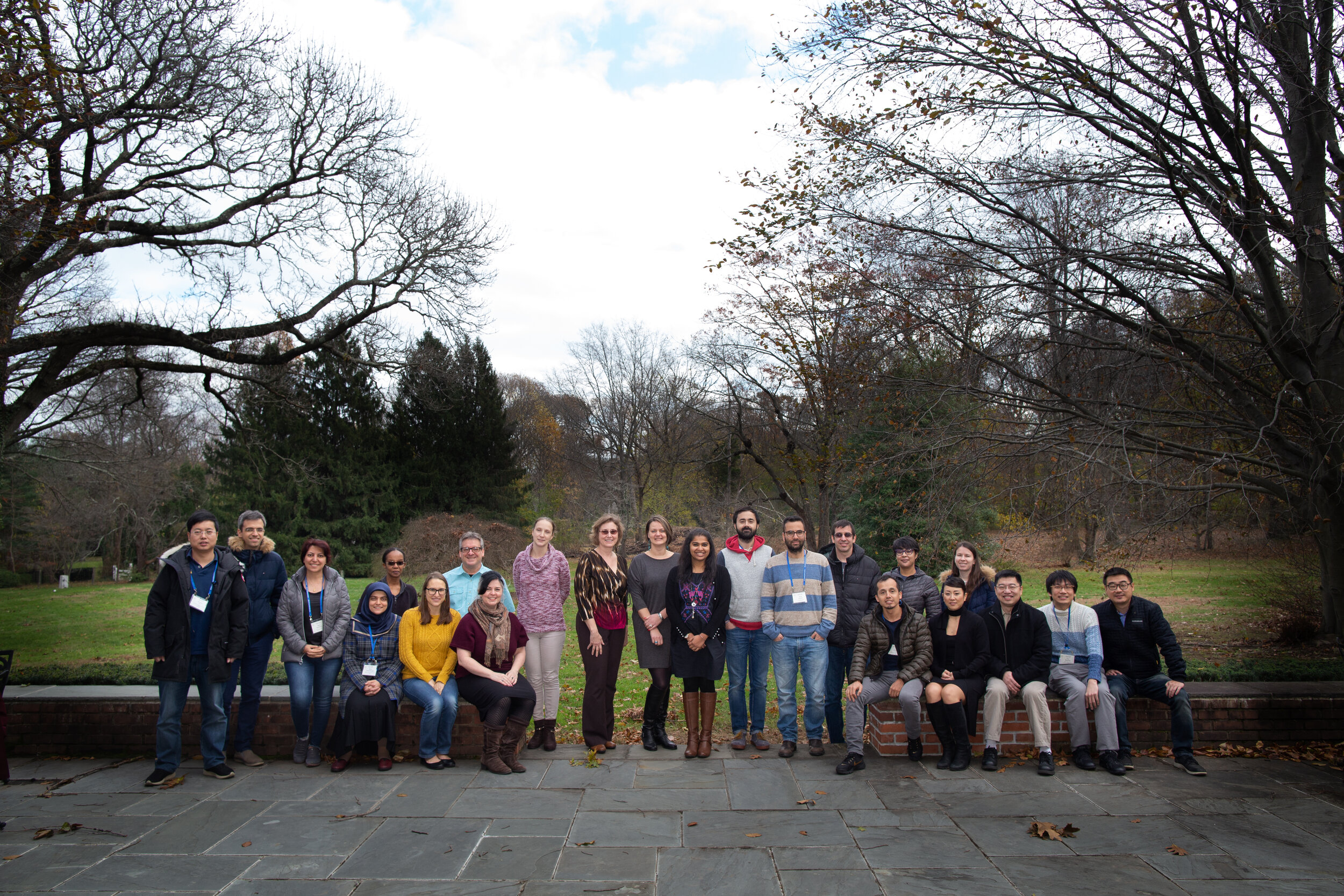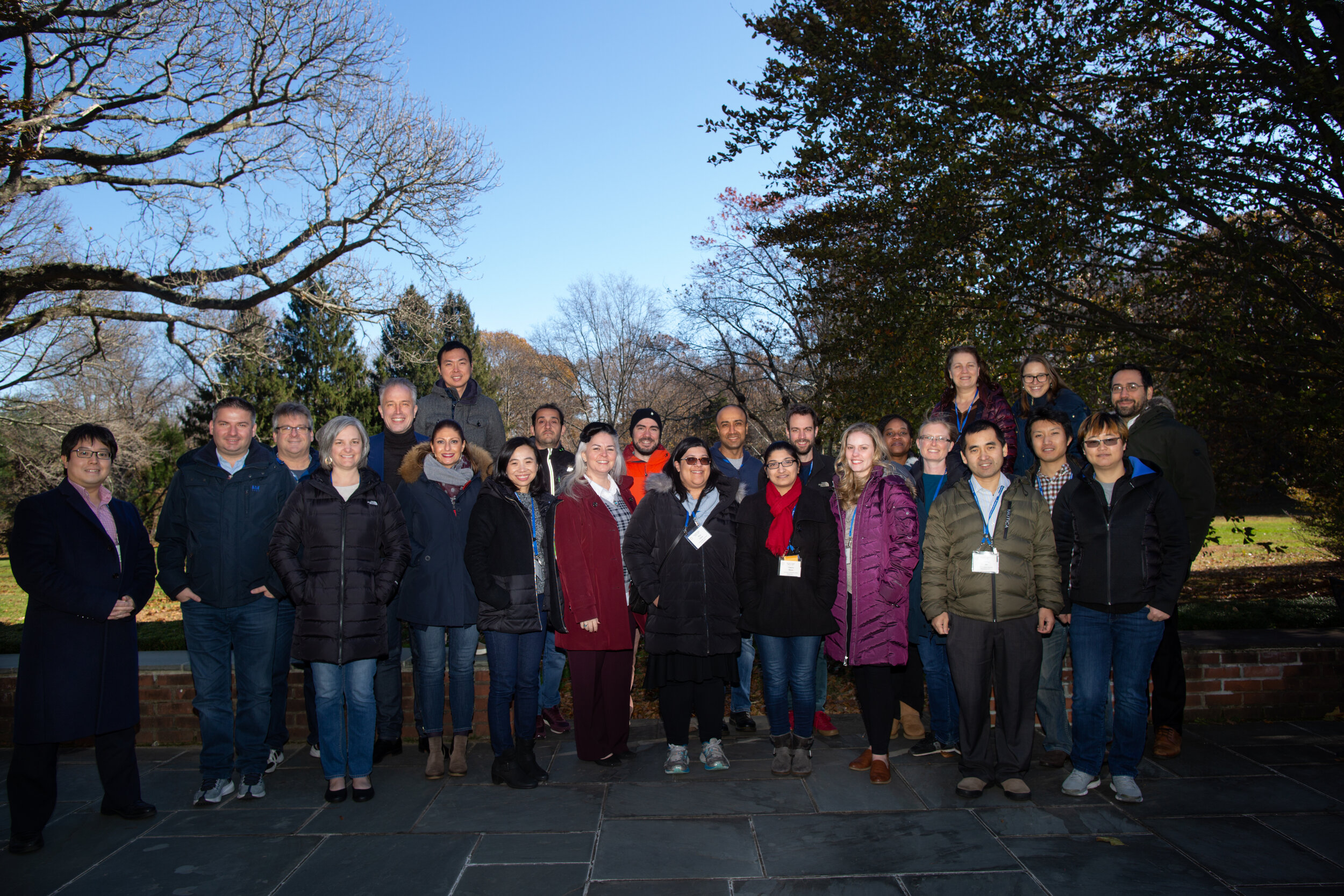The CSHL Scientific Writing Retreat is a four-day writing workshop offered annually in the fall at the stately Banbury Center. Guided by their main principle that “there’s no good scientific writing, there’s only good writing” the retreat aims to provide its participants with expert feedback on their specific writing project, and the environment to “get away” and write.
This past April, Co-Instructors Charla Lambert of Cold Spring Harbor Laboratory (CSHL) and Stephen Matheson of Cell Reports organized the first-ever one-day virtual refresher course and reunion for their alumni. The refresher course was also attended by past coaches and followed by an alumni social.
A peek into “The Stephen Matheson Show” during the 2020 virtual edition of the writing retreat.
Image: Charla Lambert
We met up with Charla and Stephen to chat about their workshop, beginning the discussion with what inspired the format of the workshop.
Stephen: That is definitely a question for Charla because this is totally her invention. I think I’ve got this right, that the retreat was modeled after other programs at CSHL?
Charla: The format I dreamed up was patterned a little after the leadership workshop CSHL ran each spring for nine years. It was part didactic or lecture, part small group work, with lots of role playing and open discussions so people could bring their own experiences and get what they need out of the workshop. I also patterned the writing retreat after the Santa Fe Science Writing Workshop, which is an annual, week-long workshop taught by science journalists for non-science writers. I did that workshop while in graduate school and it was lectures in the morning, meetings with small groups, retreating to your rooms to write something each day, trying out different styles, getting lots of feedback, and revising. That totally informed how I wanted to structure the CSHL retreat, so people had good chunks of time to be able to work on their own.
Given the high volume of applications this course receives, this question might be unnecessary but I’ll ask it anyway: Did you for notice a need for this type of workshop?
Charla: There was definitely a need for this kind of training, this hybrid between teaching good writing principles and just letting people get away from their lives to focus on what they’re writing. And specifically, there was a need at the postdoc and junior faculty level. Postdocs in particular tend to be forgotten by their universities, so this kind of program serves a unique niche.
Stephen: The need for scientists to learn how to write is something an editor like me knows painfully well. Charla didn't have to convince me of the reasons to have a scientific writing retreat!
The Scientific Writing Retreat has been offered in-person every fall since 2015 and virtually in 2020. Excluding the workshop last year, how has it changed over the past iterations?
Stephen: We changed how we cover writing for non-expert audiences. In 2015 and 2016, we worked with the Alan Alda Center for Communicating Science, which runs great programs in science communication for scientists. They helped us with a lot of things, then we struck out on our own and designed our own module in 2017. I do a lot of writing for general audiences; I’m skilled at it and Charla is too so we’re qualified to do it. We also added new coaches like Jackie Jansen who have a lot of experience in this area.
Charla: What we’re trying to do is not necessarily teach people how to write or speak to a lay audience in general, but how to write for non-experts in very specific areas where scientists have to do it: Grants, abstracts for some journals, faculty websites, things like that. How you go from being a scientist to a skilled writer for a lay audience ended up being too much to accomplish in one evening. So we focused it to something more manageable and accessible.
Stephen: I’ll add that we’ve done this more and more empathetically in recent years. One of the hardest things you can ask a scientist to do is to talk to a person outside their field about their work. It’s also one of the most important, I think. And it calls for a little bit of empathy.
Charla: Before, we would just tell the trainees what they were doing wrong without acknowledging that writing for non-expert audiences is a really hard task. It’s really hard to talk about your own science, which you live and breathe, in a way that is accessible, understandable, and exciting to someone who’s not in your field. Injecting some empathy into the exercises to explicitly acknowledge that has helped some of the trainees work through the mind blocks they had with this kind of writing in the past.
In addition to one-on-one time with the various coaches, the trainees break into smaller groups. Do these groups form randomly or do you break them up using certain parameters? If so, is it based on field of research?
Sign-up board for one-on-one time with the various writing retreat coaches.
Charla: That’s another big change that we made. The first year of the retreat, I tried to accept applicants so the small groups contained people in the same discipline. The reasoning was that it might be important to have someone in your discipline in your small group to help work through very specific, technical passages. By the second year though, it was apparent that it was much more valuable for people who were working on the same thing to get together in small groups. Postdocs working on fellowship applications, people working on manuscripts that are computational, people working on manuscripts that are experimental, R01 grants, faculty job applications, etc. Everybody comes to the retreat from some area of biology and we group them together not necessarily on discipline, but rather what they’re working on. I think it’s worked out better: Once a person hears feedback from people in their small group and some of the coaches about potential issues with their writing, they can start to recognize that issue in their own writing.
Stephen: I’ll echo that and I’ll give a specific example. In my group once, someone brought a paper they were drafting. The introduction described two kinds of disease: inherited and sporadic. I know what ‘inherited’ and ‘sporadic’ are, and so does the person who wrote it, but another very smart person who wasn’t a geneticist didn’t and asked, “Now, what is ‘sporadic’?” It stopped all of us.
Charla: That’s a good question.
Stephen: Then we all realized, depending on the audience (which is one of the biggest questions a writer has to ask when they’re writing anything), you might have to stop and tell us what sporadic means. There’s a little piece of jargon that a smart person caught and, had we all been geneticists, there’s no way we would have thought of that.
I like how we’ve tweaked it though. We get feedback from students and we consider it very carefully. So the retreat changes a little every year. And it should, right? I like that. I’m proud of that.
Can you share some insight into what you look for when reviewing applications and choosing the next crop of trainees?
Stephen: We do have a particular demographic in mind, and it’s not just anyone who’s a scientist. This retreat is designed and optimized for postdocs and junior faculty.
Charla: One of the other big filters I use when reading applications is: Does an applicant have something they’re working on? I will usually filter out somebody who just wants to come and learn good writing, but doesn’t have a piece they’re actively working on. But someone who wants to learn how to write well and can also describe a manuscript they’re struggling to draft, or a fellowship deadline they’re working toward, that’s the kind of applicant I look for.
Stephen: Some people might legitimately want to participate in the retreat because their English is developing and they want to strengthen their English writing skills. Unfortunately, if they’re not already a fluent English speaker, this retreat won’t be appropriate for them.
Charla: With that said, there are plenty of people who participate in the retreat but are not native English speakers, because that’s the state of science: It’s very international. Past participants have been from institutions across Asia, Europe, North and South America. We just look for people who are reasonably fluent in English so they can focus on communicating their science, not necessarily struggling with their English.
The CSHL Banbury Conference Center provides the perfect setting to “get away” and write. But add snow and an endless supply of snacks and hot beverages into the mix? We’d be hard pressed to imagine an even more ideal place to work on a writing project (and what the 2018 retreat participants were treated to)!
Image: Charla Lambert
How is this retreat different from other writing workshops?
Stephen: Are there any?
Charla: I think the niche for this is the career-level we target, and the fact that people spend large blocks of time working on something that is their own.
Stephen: When I first told my colleagues at Cell that I’m going to be part of this, every single person reacted with “Oh that’s great! How often do they do it?” When I told them the retreat is held once a year, they responded with “Well that’s not enough!” So there’s a strong sense among myself and my colleagues that this so clearly meets a basic training need. It’s not fair to ask mentors to do what we’re able to do -- we can concentrate resources here that no postdoc mentor can do at any big lab. I’d like to see it reproduced actually, and used on a couple of coasts.
Charla: We’ll go national.
Stephen: I mean it’ll be franchised, obviously so.
Charla: One of our guiding principles is that there’s no good scientific writing, there’s only good writing. We focus on good writing principles in general, and how they apply in different contexts for different writing projects. So it’s not how to become a savvy grant writer for the NIH, and it’s not how to get a paper published at Cell. It’s not that kind of retreat. It’s more about how to become a good writer and will you leave after 4 days making significant progress on something you’re working on. I think that makes the retreat very different than a lot of other workshops people might take at their home institutions.
Last question: Does the course have a trainee success story?
Charla: In the first year, we had a trainee who was almost a mid-level PI and not a native English speaker. She had one R01 application rejected and this was her make-or-break point: if her next application wasn’t funded she basically had to leave her institution. She worked side-by-side with one of our coaches, Sydney Gary, and her proposal ended up being funded.
Stephen: One year, one of the students went to three coaches in a row, showing us her abstract. I don’t know if she was testing us.
Charla: She was collecting data.
Stephen: I was the last one and when I was done she said, “Wow. That’s really impressive. I showed all of you my abstract and you all made the same suggestions.” It’s gratifying when people realize there’s actually a well-defined ball of knowledge, expertise, and skill that they can acquire and actively work on.
Many thanks to Charla and Stephen for taking the time to speak with us about their workshop. The Scientific Writing Retreat will be held again in November so if you are working on a writing project and find yourself “stuck,” be sure to check out this year’s course. Charla and Stephen are welcoming applications until September 13, 2021.
